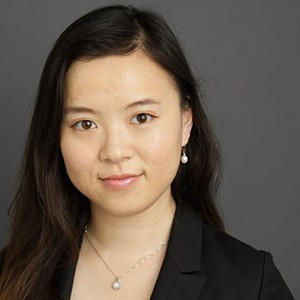
By Kimberley Clementi
Rose Yu, an assistant professor in UC San Diego’s Department of Computer Science and Engineering (CSE), has been awarded $1 million by the Army to develop a novel deep learning (DL) framework based on symmetry.
The funding comes from U.S. Army Combat Capabilities Development Command Army Research Laboratory’s prestigious Early Career Program (ECP) Award, which incentivizes early career university faculty to pursue fundamental research in areas that could have significant impact on Army operational capabilities and related technologies.
Rose Yu’s proposal, Exploiting Symmetry for Learning Spatiotemporal Dynamics, was funded for 5 years. As the term “spatiotemporal” implies, Yu will be using symmetry-aware DL models to look at data across space and time,
Yu will work with rich spatiotemporal data collected from night vision sensors, weapons sights, and navigational devices as basic building blocks for dynamics learning and decision-making. She expects her framework will solve tasks including trajectory forecasting, motion planning, surrogate modeling, and video prediction while also reducing operational costs.
“Ultimately, our framework would enable a new generation of AI [Artificial Intelligence] methods that can efficiently learn, reason, act and adapt in complex, multi-modal, highly dynamic environments,” said Yu.
The ability to derive knowledge from real-time sensing data has direct applications for the Department of Defense (DoD). For example, Yu foresees AI methods that can predict the complex dynamics of enemy behavior and model diverse environment dynamics and patterns in adverse scenarios. Yu’s approach – designed to be fast, robust, and adaptable – could be mission critical.
“Improving dynamics learning to guide decision-making in complex spatiotemporal environments is of paramount importance to DoD,” said Yu. “Understanding rich multimodal sensory inputs and ensuring trustworthy AI systems requires a shift from pure data-driven to hybrid physics-guided learning to ensure that AI systems can model various unexpected phenomena in future battlefields with limited information.”
The Army-ECP is the latest award for Yu, who received previous funding from the Army Research Office, a directorate of DEVCOM ARL, to support her project, Physics-Guided Learning for Sample Efficient Spatiotemporal Decision Making, and a $600,000 grant from the DoD’s Defense University Research Instrumentation Program (DURIP) to fund a deep learning cluster to store and process real-time sensor data from robotic vehicles and drones.
Yu’s current ARO proposal is also under consideration for the Presidential Early Career Award for Scientists and Engineers (PECASE) – the highest honor bestowed by the United States government to those who show exceptional promise in their fields. She was recognized in 2022 with the prestigious National Science Foundation’s Faculty Early Career Development (CAREER) Award.
Yu is affiliated with Halıcıoğlu Data Science Institute, Contextual Robotics Institute, Bioinformatics and Systems Biology, and Center for Machine-Integrated Computing and Security.

